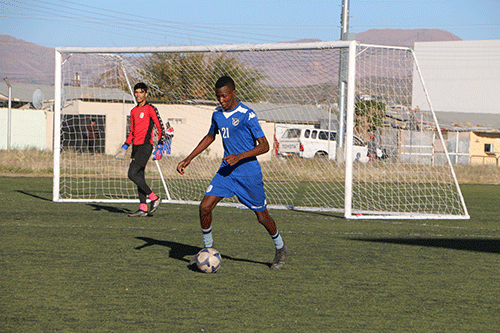The Namibian U/17 boys’ team has been putting their skills to the test in a series of challenging games against German opponents. With three games already played and two more remaining, the team has shown strong determination to improve.
“In terms of results, we have played three games so far,” said the team’s coach, Pauhl Mallembu.
“Although we faced defeat in two of them, the performance of our boys has been satisfactory. We are focused on giving them a chance to develop their skills and talents. The boys are improving, and they are willing to learn,” he said.
Reflecting on the matches played, the coach assessed the team’s performance against tough opposition.
“Our opponents have been well prepared from an early stage of their childhood, which has given them an advantage,” the coach explained.
“Despite this, our boys have shown great potential and are adapting to different football principles.”
With two crucial games remaining in their schedule, the coach emphasised the importance of these matches, saying, “Our last two games are crucial, and we aim to play good football and restore our pride. We see these games as an opportunity to showcase our abilities and continue our development”.
When asked about the lessons learned throughout the tournament, the coach provided insights from both a coaching perspective and the players’ feedback.
“From a coaching point of view, we have realised that development is an ongoing process. We need to expose our boys to different football principles, engage them in various football programmes and coach them systematically. They must be able to adapt to various football tactics,” the coach said.
He also revealed the players’ perspectives gained through team meetings before and after the games.
“The players have honestly admitted that our counterparts are more advanced in many aspects of the game. They have learned that football should be taken seriously as a career, not just a hobby. The players have also expressed that they are not accustomed to training twice a day and feel that the workload is quite demanding,” he said.
Despite the challenges faced, the coach highlighted the importance of these games for the boys and their prospects: “These games are paramount, as we are preparing for the Region 5 Games to be hosted in Namibia, and there is a lot of potential in this team,” he emphasised.
“We have a young squad, with six players under the age of 15, and a bright future ahead. Developing players is not easy, but with the support and resources from the NFA and other stakeholders, we can achieve much better results.” Inspired by the success of German football, the coach has engaged with elite youth coaches from the Westphalia region to gather insights, who agreed that “we need to create a culture for developing football talents at an early age,” the coach stated. “Our football programmes in Namibia need better regulation by the NFA, and our coaching philosophy must be well-structured to suit our unique circumstances. The supervision and monitoring of youth football at the grassroots level by all stakeholders are essential for identifying priorities and nurturing talent. We should focus on teaching the basics of football to our boys and girls on the field of play.”


